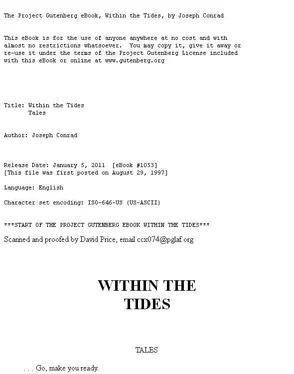Renouard’s violent but repressed exclamation was lost in a general murmur and shuffle of feet. The Editor made a step forward, bowed with creditable steadiness.
“Miss Moorsom, allow me to congratulate you from the bottom of my heart on the happy—er—issue. . . ”
“Wait,” muttered Renouard irresolutely.
The Editor jumped on him in the manner of their old friendship. “Ah, you! You are a fine fellow too. With your solitary ways of life you will end by having no more discrimination than a savage. Fancy living with a gentleman for months and never guessing. A man, I am certain, accomplished, remarkable, out of the common, since he had been distinguished” (he bowed again) “by Miss Moorsom, whom we all admire.”
She turned her back on him.
“I hope to goodness you haven’t been leading him a dog’s life, Geoffrey,” the Editor addressed his friend in a whispered aside.
Renouard seized a chair violently, sat down, and propping his elbow on his knee leaned his head on his hand. Behind him the sister of the professor looked up to heaven and wrung her hands stealthily. Mrs. Dunster’s hands were clasped forcibly under her chin, but she, dear soul, was looking sorrowfully at Willie. The model nephew! In this strange state! So very much flushed! The careful disposition of the thin hairs across Willie’s bald spot was deplorably disarranged, and the spot itself was red and, as it were, steaming.
“What’s the matter, Geoffrey?” The Editor seemed disconcerted by the silent attitudes round him, as though he had expected all these people to shout and dance. “You have him on the island—haven’t you?”
“Oh, yes: I have him there,” said Renouard, without looking up.
“Well, then!” The Editor looked helplessly around as if begging for response of some sort. But the only response that came was very unexpected. Annoyed at being left in the background, and also because very little drink made him nasty, the emotional Willie turned malignant all at once, and in a bibulous tone surprising in a man able to keep his balance so well—
“Aha! But you haven’t got him here—not yet!” he sneered. “No! You haven’t got him yet.”
This outrageous exhibition was to the Editor like the lash to a jaded horse. He positively jumped.
“What of that? What do you mean? We—haven’t—got—him—here. Of course he isn’t here! But Geoffrey’s schooner is here. She can be sent at once to fetch him here. No! Stay! There’s a better plan. Why shouldn’t you all sail over to Malata, professor? Save time! I am sure Miss Moorsom would prefer. . .”
With a gallant flourish of his arm he looked for Miss Moorsom. She had disappeared. He was taken aback somewhat.
“Ah! H’m. Yes. . . . Why not. A pleasure cruise, delightful ship, delightful season, delightful errand, del . . . No! There are no objections. Geoffrey, I understand, has indulged in a bungalow three sizes too large for him. He can put you all up. It will be a pleasure for him. It will be the greatest privilege. Any man would be proud of being an agent of this happy reunion. I am proud of the little part I’ve played. He will consider it the greatest honour. Geoff, my boy, you had better be stirring to-morrow bright and early about the preparations for the trip. It would be criminal to lose a single day.”
He was as flushed as Willie, the excitement keeping up the effect of the festive dinner. For a time Renouard, silent, as if he had not heard a word of all that babble, did not stir. But when he got up it was to advance towards the Editor and give him such a hearty slap on the back that the plump little man reeled in his tracks and looked quite frightened for a moment.
“You are a heaven-born discoverer and a first-rate manager. . . He’s right. It’s the only way. You can’t resist the claim of sentiment, and you must even risk the voyage to Malata. . . ” Renouard’s voice sank. “A lonely spot,” he added, and fell into thought under all these eyes converging on him in the sudden silence. His slow glance passed over all the faces in succession, remaining arrested on Professor Moorsom, stony eyed, a smouldering cigar in his fingers, and with his sister standing by his side.
“I shall be infinitely gratified if you consent to come. But, of course, you will. We shall sail to-morrow evening then. And now let me leave you to your happiness.”
He bowed, very grave, pointed suddenly his finger at Willie who was swaying about with a sleepy frown. . . . “Look at him. He’s overcome with happiness. You had better put him to bed . . . ” and disappeared while every head on the terrace was turned to Willie with varied expressions.
Renouard ran through the house. Avoiding the carriage road he fled down the steep short cut to the shore, where his gig was waiting. At his loud shout the sleeping Kanakas jumped up. He leaped in. “Shove off. Give way!” and the gig darted through the water. “Give way! Give way!” She flew past the wool-clippers sleeping at their anchors each with the open unwinking eye of the lamp in the rigging; she flew past the flagship of the Pacific squadron, a great mass all dark and silent, heavy with the slumbers of five hundred men, and where the invisible sentries heard his urgent “Give way! Give way!” in the night. The Kanakas, panting, rose off the thwarts at every stroke. Nothing could be fast enough for him! And he ran up the side of his schooner shaking the ladder noisily with his rush.
On deck he stumbled and stood still.
Wherefore this haste? To what end, since he knew well before he started that he had a pursuer from whom there was no escape.
As his foot touched the deck his will, his purpose he had been hurrying to save, died out within. It had been nothing less than getting the schooner under-way, letting her vanish silently in the night from amongst these sleeping ships. And now he was certain he could not do it. It was impossible! And he reflected that whether he lived or died such an act would lay him under a dark suspicion from which he shrank. No, there was nothing to be done.
He went down into the cabin and, before even unbuttoning his overcoat, took out of the drawer the letter addressed to his assistant; that letter which he had found in the pigeon-hole labelled “Malata” in young Dunster’s outer office, where it had been waiting for three months some occasion for being forwarded. From the moment of dropping it in the drawer he had utterly forgotten its existence—till now, when the man’s name had come out so clamorously. He glanced at the common envelope, noted the shaky and laborious handwriting: H. Walter, Esqre. Undoubtedly the very last letter the old butler had posted before his illness, and in answer clearly to one from “Master Arthur” instructing him to address in the future: “Care of Messrs. W. Dunster and Co.” Renouard made as if to open the envelope, but paused, and, instead, tore the letter deliberately in two, in four, in eight. With his hand full of pieces of paper he returned on deck and scattered them overboard on the dark water, in which they vanished instantly.
He did it slowly, without hesitation or remorse. H. Walter, Esqre, in Malata. The innocent Arthur—What was his name? The man sought for by that woman who as she went by seemed to draw all the passion of the earth to her, without effort, not deigning to notice, naturally, as other women breathed the air. But Renouard was no longer jealous of her very existence. Whatever its meaning it was not for that man he had picked up casually on obscure impulse, to get rid of the tiresome expostulations of a so-called friend; a man of whom he really knew nothing—and now a dead man. In Malata. Oh, yes! He was there secure enough, untroubled in his grave. In Malata. To bury him was the last service Renouard had rendered to his assistant before leaving the island on this trip to town.
Читать дальше












